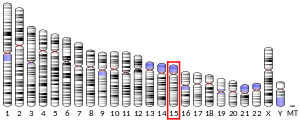LCMT2
Protein-coding gene in the species Homo sapiens
| LCMT2 | |||||||||||||||||||||||||||||||||||||||||||||||||||
|---|---|---|---|---|---|---|---|---|---|---|---|---|---|---|---|---|---|---|---|---|---|---|---|---|---|---|---|---|---|---|---|---|---|---|---|---|---|---|---|---|---|---|---|---|---|---|---|---|---|---|---|
| Identifiers | |||||||||||||||||||||||||||||||||||||||||||||||||||
| Aliases | LCMT2, PPM2, TYW4, leucine carboxyl methyltransferase 2 | ||||||||||||||||||||||||||||||||||||||||||||||||||
| External IDs | OMIM: 611246; MGI: 1353659; HomoloGene: 19642; GeneCards: LCMT2; OMA:LCMT2 - orthologs | ||||||||||||||||||||||||||||||||||||||||||||||||||
| |||||||||||||||||||||||||||||||||||||||||||||||||||
| |||||||||||||||||||||||||||||||||||||||||||||||||||
| |||||||||||||||||||||||||||||||||||||||||||||||||||
| |||||||||||||||||||||||||||||||||||||||||||||||||||
| |||||||||||||||||||||||||||||||||||||||||||||||||||
| Wikidata | |||||||||||||||||||||||||||||||||||||||||||||||||||
| |||||||||||||||||||||||||||||||||||||||||||||||||||
Leucine carboxyl methyltransferase 2 is an enzyme that in humans is encoded by the LCMT2 gene.[5][6][7]
The protein encoded by this intronless gene belongs to the methyltransferase superfamily and acts as a G1/S and G2/M phase checkpoint regulator. It has been hypothesized that cigarette smoke-induced oxidative stress and transforming growth factor beta 1 may inhibit cellular proliferation by modulating the expression of this protein.[7]
References
- ^ a b c GRCh38: Ensembl release 89: ENSG00000168806 – Ensembl, May 2017
- ^ a b c GRCm38: Ensembl release 89: ENSMUSG00000074890 – Ensembl, May 2017
- ^ "Human PubMed Reference:". National Center for Biotechnology Information, U.S. National Library of Medicine.
- ^ "Mouse PubMed Reference:". National Center for Biotechnology Information, U.S. National Library of Medicine.
- ^ Nagase T, Ishikawa K, Miyajima N, Tanaka A, Kotani H, Nomura N, Ohara O (Aug 1998). "Prediction of the coding sequences of unidentified human genes. IX. The complete sequences of 100 new cDNA clones from brain which can code for large proteins in vitro". DNA Res. 5 (1): 31–9. doi:10.1093/dnares/5.1.31. PMID 9628581.
- ^ Noma A, Suzuki T (Dec 2006). "Ribonucleome analysis identified enzyme genes responsible for wybutosine synthesis". Nucleic Acids Symp Ser (Oxf). 50 (50): 65–6. doi:10.1093/nass/nrl032. PMID 17150819.
- ^ a b "Entrez Gene: LCMT2 leucine carboxyl methyltransferase 2".
Further reading
- De Baere I, Derua R, Janssens V, et al. (2000). "Purification of porcine brain protein phosphatase 2A leucine carboxyl methyltransferase and cloning of the human homologue". Biochemistry. 38 (50): 16539–47. doi:10.1021/bi991646a. PMID 10600115.
- Strausberg RL, Feingold EA, Grouse LH, et al. (2003). "Generation and initial analysis of more than 15,000 full-length human and mouse cDNA sequences". Proc. Natl. Acad. Sci. U.S.A. 99 (26): 16899–903. Bibcode:2002PNAS...9916899M. doi:10.1073/pnas.242603899. PMC 139241. PMID 12477932.
- Marwick JA, Kirkham P, Gilmour PS, et al. (2003). "Cigarette smoke-induced oxidative stress and TGF-beta1 increase p21waf1/cip1 expression in alveolar epithelial cells". Ann. N. Y. Acad. Sci. 973: 278–83. doi:10.1111/j.1749-6632.2002.tb04649.x. PMID 12485877. S2CID 84732926.
- Ng CC, Arakawa H, Fukuda S, et al. (2003). "p53RFP, a p53-inducible RING-finger protein, regulates the stability of p21WAF1". Oncogene. 22 (28): 4449–58. doi:10.1038/sj.onc.1206586. PMID 12853982.
- Gerhard DS, Wagner L, Feingold EA, et al. (2004). "The status, quality, and expansion of the NIH full-length cDNA project: the Mammalian Gene Collection (MGC)". Genome Res. 14 (10B): 2121–7. doi:10.1101/gr.2596504. PMC 528928. PMID 15489334.
- Kawamata N, Inagaki N, Mizumura S, et al. (2005). "Methylation status analysis of cell cycle regulatory genes (p16INK4A, p15INK4B, p21Waf1/Cip1, p27Kip1 and p73) in natural killer cell disorders". Eur. J. Haematol. 74 (5): 424–9. doi:10.1111/j.1600-0609.2005.00417.x. PMID 15813917. S2CID 46197026.
- Noma A, Kirino Y, Ikeuchi Y, Suzuki T (2006). "Biosynthesis of wybutosine, a hyper-modified nucleoside in eukaryotic phenylalanine tRNA". EMBO J. 25 (10): 2142–54. doi:10.1038/sj.emboj.7601105. PMC 1462984. PMID 16642040.
- Liu FY, Qi JP, Xu FL, Wu AP (2006). "Clinicopathological and immunohistochemical analysis of gastrointestinal stromal tumor". World J. Gastroenterol. 12 (26): 4161–5. doi:10.3748/wjg.v12.i26.4161. PMC 4087364. PMID 16830365.
- Moon SK, Choi YH, Kim CH, Choi WS (2006). "p38MAPK mediates benzyl isothiocyanate-induced p21WAF1 expression in vascular smooth muscle cells via the regulation of Sp1". Biochem. Biophys. Res. Commun. 350 (3): 662–8. doi:10.1016/j.bbrc.2006.09.092. PMID 17026958.
- v
- t
- e


















